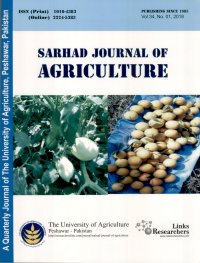Barriers to Gender Equality in Agricultural Extension in Pakistan: Evidences from District Sargodha
Barriers to Gender Equality in Agricultural Extension in Pakistan: Evidences from District Sargodha
Muhammad Luqman1,3, Raheel Saqib2*, Xu Shiwei3 and Yu Wen3
ABSTRACT
The present study was designed to find out the barriers which limit the active participation of both the genders (men and women) in agricultural operations and also towards gender disparity in agricultural extension. Agriculture comprises of a number of farming activities, where both men and women are involved in multiple diverse nature of field operations. Inspite of their high contribution in farm and non-farm activities, there exist gender disparity with reference to agricultural extension, education and other farm advisory services. The study was conducted in district Sargodha located in the central Punjab, Pakistan. Personal interviews were conducted from male head as well as spouses of each selected farm family. The total sample size of the study was 300 (150 male and 150 female spouses). A designed structured questionnaire was prepared for the data collection as the research instrument. The data thus collected were coded on SPSS for analysis and interpretation. Results showed that there is significant difference in age and educational status of male heads and their spouses. Majority of the farm families (39.3%) earn income for their livelihoods both from farming and non-farming sources. Intensity of participation of female respondents in different crops and livestock activities was comparatively high as compared to their male counterparts. It was found that average daily share of female in crops related activities was 42% and in livestock activities was 53%. Inspite of their participation in crops and livestock activities it was found that compared to female respondents, male family heads had access to agricultural extension/advisory and agricultural information services and credit facilities. This is due to the existing social, cultural and religious norms in the society of Pakistan. The results of the t-test statistics showed that there is highly significant difference in opinion of male family heads and their spouses (female respondents) regarding barriers to gender equality in agricultural extension in Pakistan
To share on other social networks, click on any share button. What are these?







